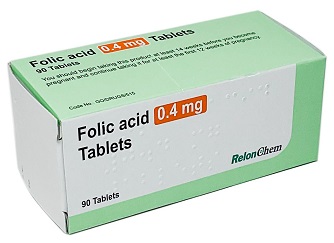COVID-19 Supplements: The Role of Folic Acid (Vitamin B9) In SARS-CoV-2 Infection- Discovering The Optimal Range Of Physiological Levels
COVID-19 Supplements - Folic Acid (Vitamin B9) Mar 22, 2023 2 years, 4 weeks, 1 day, 8 hours, 59 minutes ago
COVID-19 Supplements: A new study review by researchers from the University of Thessaly, Biopolis-Greece poses the warning that folic acid levels in an individual can determine the direction of the disease progression of a SARS-CoV-2 infection and even the risk of mortality, and that further studies are needed to discover what is the optimal range of physiological levels dosing to reap the protective and therapeutic benefits of the supplement.

Folic acid (vitamin B9) is crucial for various biochemical processes, including amino acid, neurotransmitter, nucleotide, and vitamin synthesis. As a vital nutrient, folate plays a key role in human homeostasis and has high metabolic activity due to its capacity to interact with various chemical bonds. It serves as a cofactor in essential one-carbon pathways, donating methyl groups to various molecules.
Mammals cannot produce folate, so they rely on folic acid-fortified foods and supplements. However, folic acid is inactive in the human body and must be converted into 5-methyltetrahydrofolate (5-MTHF) by the liver. This active molecule participates in numerous metabolic reactions as a methyl donor, contributing to glycine synthesis, homocysteine-to-methionine conversion, and DNA precursor molecule production.
Folate deficiency can result from factors such as hereditary malabsorption, poor diet, obesity, alcohol consumption, and kidney failure. It can lead to health issues like anemia, impaired reproductive health, and developmental problems. Folate has been linked to protective effects against neural tube defects, neurological diseases, and cancer.
The study review explored the potential connection between folic acid levels and SARS-CoV-2, examining the possible impact of vitamin intake on health outcomes related to the viral infection.
SARS-CoV-2, a dangerous RNA virus, can cause severe respiratory problems with high morbidity and mortality rates.
Folic acid (FA) is an essential vitamin that plays a crucial role in maintaining human health and may affect vulnerability to viral infections.
This is the first study review to have examined the relationship between Folic acid (FA) intake and SARS-CoV-2 infection, as well as its potential impact on patients' health outcomes.
This comprehensive study examines the potential interaction between folic acid (FA) and the SARS-CoV-2 viral infection, using a combination of molecular docking, in silico models, and real-world patient studies.
In silico studies and molecular docking data suggest that folic acid or FA could inhibit the virus's entry into host cells and prevent viral replication by binding at essential residues.
https://www.sciencedirect.com/science/article/pii/S0306987721000578
https://www.tandfonline.com/doi/full/10.1080/13880209.2022.2063341
https://www.sciencedirect.com/science/article/pii/S0141813020344974
https://www.ing
entaconnect.com/content/ben/cad/2021/00000017/00000003/art00015
https://link.springer.com/article/10.1007/s13337-020-00643-6
https://link.springer.com/article/10.1007/s00894-022-05138-3
However, real-world patient data presents conflicting results, with some studies indicating that Folic Acid supplementation might be protective against SARS-CoV-2 infection, while others suggest it could increase the risk of mortality following infection.
https://www.frontiersin.org/articles/10.3389/fphar.2020.01062/full
https://pubmed.ncbi.nlm.nih.gov/36002213/
https://pubmed.ncbi.nlm.nih.gov/32765270/
A previous
COVID-19 Supplements news coverage warned that excessive Folic Acid could actually increase not only risk of contracting COVID-19 but also increase COVID-19 mortality risk!
https://www.thailandmedical.news/news/international-study-shows-high-doses-of-vitamin-b9-folic-acid-increases-covid-19-risk-and-also-covid-19-mortality-risk
In silico models offer several advantages, such as rapid predictions for a large set of compounds, the ability to include virtually unlimited parameters, and ethical considerations. However, these models also have significant limitations, including a lack of confidence in scoring functions' abilities.
Patient studies suggest that both insufficient and excessive folate levels might negatively impact host resistance to SARS-CoV-2 infection, indicating an optimal physiological folate range related to host resistance and COVID-19 infection severity. Moreover, the increased risk of infection, hospitalization, and mortality among certain racial and ethnic groups must also be considered.
Despite advancements in folate pathway research, many questions remain unanswered, such as why normal Folic Acid concentrations cannot inhibit SARS-CoV-2 entry into target cells and what concentrations of Folic Acid would be effective in preventing infection.
Folate's role in conditions like long COVID or emerging variants also warrants further investigation. Additionally, high Folic Acid intake has been associated with adverse effects, including masking vitamin B12 deficiency and promoting carcinogenesis or cancer recurrence in specific populations.
Emerging evidence also suggests that Folic Acid supplementation impacts other viral infections, such as human immunodeficiency virus (HIV), hepatitis B virus, and Zika virus. Folate deficiency has been linked to HPV-associated cervical dysplasia progression, compromised cellular immunity, and Ebola virus cell entry. Folate's role in DNA synthesis, repair, and methylation forms the basis for its potential role in cancer prevention and as a target for developing new drugs against infectious diseases.
The study's primary limitation is the small number of patient studies available, many of which are observational and prone to bias. More extensive studies are needed to validate the findings and raise awareness among scientists and physicians about Folic Acid A potential impact on SARS-CoV-2 infection.
In conclusion, while in silico studies and molecular docking data support the potential inhibitory role of FA in SARS-CoV-2 infection, further research is necessary to determine the optimal range of physiological folate levels, the potential association between Folic Acid and SARS-CoV-2 infection, and the effect of Folic Acid in vaccinated patients. Investigating other forms of folate and their impact on health outcomes and antibody titers could also shed light on the potential benefits of Folic Acid in the treatment of SARS-CoV-2 infections.
The complex relationship between Folic Acid and SARS-CoV-2 will likely continue to concern both laboratory scientists and clinical physicians in the foreseeable future.
The study findings were published in the peer reviewed Journal of Personalized Medicine.
https://www.mdpi.com/2075-4426/13/3/561#B35-jpm-13-00561
For the latest on
COVID-19 Supplements, keep on logging to Thailand Medical News.
